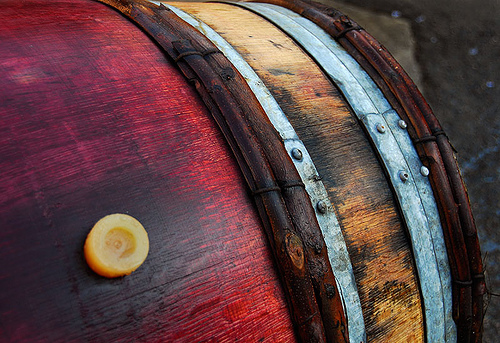FWP:
SETS == EXCLAMATION;
HUMOR
WINE: {49,1}
What a truly funny verse! It almost demands a tone of indignation. The speaker urgently wants some wine. And he's not unreasonable, he doesn't disdain small vessels-- why, he'd be perfectly content to drink if he could see 'even two or three' casks somewhere in the vicinity. He wouldn't insist on having the large number of casks that would really satisfy him. Or else we can read it 'a few even of casks'-- not to speak of a few of any other (larger?) vessels that he might actually prefer.
But why, he asks, are people pestering him with these useless little thimbles, these microscopic glasses and flagons? How could any real wine-drinker take them seriously? Surely nobody should have to put up with such nonsense! He rejects them one by one, and as a group-- he asks 'what are they?!'. This is of course a scornful, contemptuous dismissal (parallel to the 'What are you?!' in {178,1}).
Could it also even be a genuine question, like that in {162,10} ('what are these tiny little things?-- I've never seen such doll-house toys before')? No, it couldn't, says S. R. Faruqi. I happened to show this commentary to him (Nov. 2005), and he said he fully agreed with my take on the verse-- right up to this point. He said it was unduly frivolous of me to try to torture the second line into being a naive question. He said he thought my main weakness as a commentator was to be sometimes a bit too playful, too free-wheeling, too shoḳh (his word). I record his comment so that the reader can take these cross-cultural perspectives into account.
Perhaps if I were an ahl-e zabān type by birth, I'd be more disciplined by cultural constraints-- which itself might be both good and bad. I'd certainly love to know Urdu the way I know English; but then, the commentators all knew Urdu that way-- and look at the very limited results. Anyway, I just do the best job I can, according to my own understanding, as I go along. That's the nature of a commentary, after all. (Besides, it's fun.) Given the general humorlessness of the commentarial tradition, I'm glad to be able to provide a small antidote. And most of whatever little I know, I've learned through working, and discussing, and arguing, with SRF. My debt to him is incalculable, and our disagreements have always been even more revelatory to me than our agreements.
For other enjoyable 'wine-cask' verses, see {133,2}; for a full discussion of wine containers, see {28,1}.

Nazm:
In the description of wine-drinking, there won't be any poet who has not made use of exaggeration-- and that too, unpleasurable [be-lut̤f]. But they don't leave off composing on this theme. (202)
== Nazm page 202